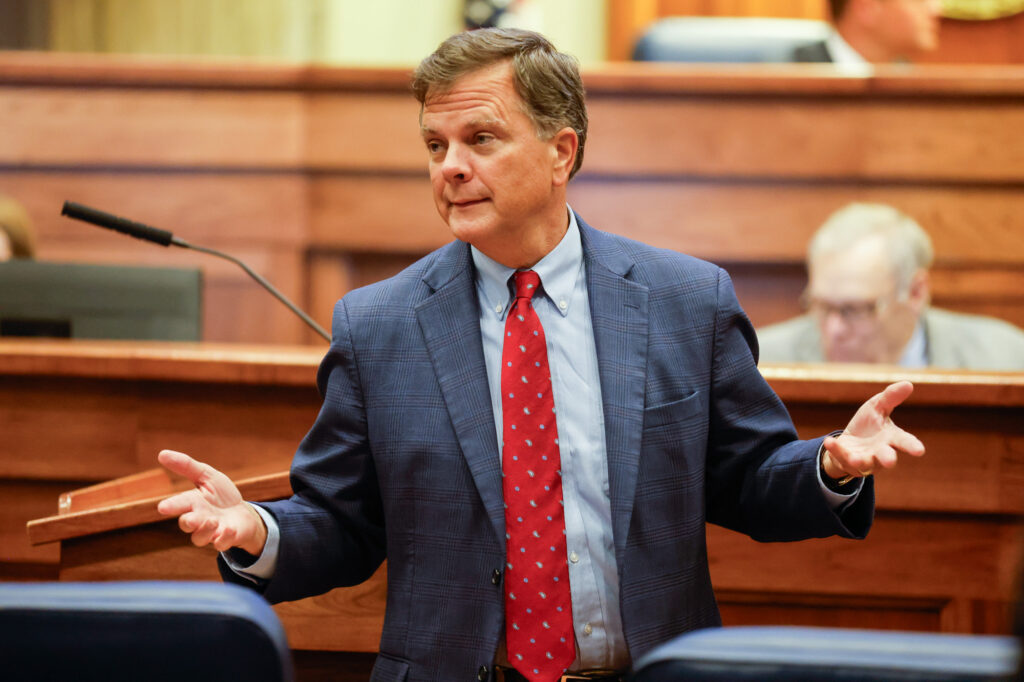The Senate Education Appropriations Chairman is considering capping governor-supported voucher school programs.
Sen. Arthur Orr (R-Decatur), chairman of the Senate Finance, Taxation and Education Committee, told members during a Wednesday morning meeting that he had previously met with “education stakeholders” to discuss the bill. Told. Mr Orr said he planned to introduce alternative measures, including a cap.
“I didn't want to give a half-baked replacement,” he said.
Get the morning headlines delivered to your inbox
No delegates were added Wednesday, and no vote was taken on the bill itself.
Senate Bill 61Or-sponsored grants of up to $7,000 for certain education-related expenses to first-time students with special needs and students below 300% of the federal poverty level; or Based on 2023 income levels, approximately $75,000 for a family of three. The law would then apply to all eligible students, regardless of income level, starting in 2027.
The bill requires the state to contribute at least $100 million to the program, which is part of the $8.8 billion Education Trust Fund that provides most of the state's K-12 school revenue. It will be covered by
Gov. Kay Ivey has made passing the bill a top priority. Nick Moore, Education Policy Advisor and Education and Workforce Reform Coordinator in the Governor's Office, introduced the bill.
“The governor believes in parallel investment in traditional public schools while also being the state that provides the most educational freedom and choice for families.”
Some Democrats on the committee questioned Moore about funding and accountability.
Senate Minority Leader Bobby Singleton (D-Greensboro) asked whether the bill could stack with the Alabama Accountability Act. This bill would allow students in the bottom 6% of their schools on standardized tests to apply for scholarships available at private schools and private schools. The maximum amount per student is approximately $10,000.
“So it's going to add up to $17,000?” he said.
Orr and Moore said the same student cannot use both funds.
Orr previously told the Reflector that he thought the bill would attract more attention than the Accountability Act because it is more flexible, such as including home education.
Education groups oppose the bill, saying it would benefit students already attending private schools and questioning how student performance under the law would be measured.
Sally Smith, executive director of the Alabama State Board of Education, said she is concerned about the long-term health of the education budget. She said she is less concerned about students leaving public schools than parents who are already seeking funding to send students to private schools.
“Can this really help poor children?” she said. “We think that's the intention, but the reality is that our poor communities don't have many options. Our underprivileged children receive the benefits that public schools offer that private schools don't.” We need services, especially transportation.”
Ashley McClain, director of government affairs for the Alabama Superintendent of Education, said she is concerned about the lack of caps and the testing component. The proposed bill would require schools receiving funding to take the test, but would not require the use of ACAP, Alabama's standardized test for public schools. She said she would also like to see test scores made public.
“If competition produces improvement, we need to know that we are in a head-to-head situation. What does that look like?” he said.
Supporters said the bill would empower parents to make decisions that are best for their children.
Terry Lathan, former chairman of the Alabama Republican Party, said the bill does not conflict with public schools or public educators, but rather enhances parents' ability to choose the best education for their children. and she praised them.
“The government isn't making money,” she says. “We spread the money around to determine what students need.”
Adam Thompson, Alabama director of Americans for Prosperity, a conservative group founded by the Koch brothers, said the bill would not defund public schools, but would simply give parents more options. Stated.
“It's not like there's no accountability,” he said. “There are testing requirements and auditing requirements. Parents don't just receive a box of cash.”
Orr said he would likely vote at the next meeting.


